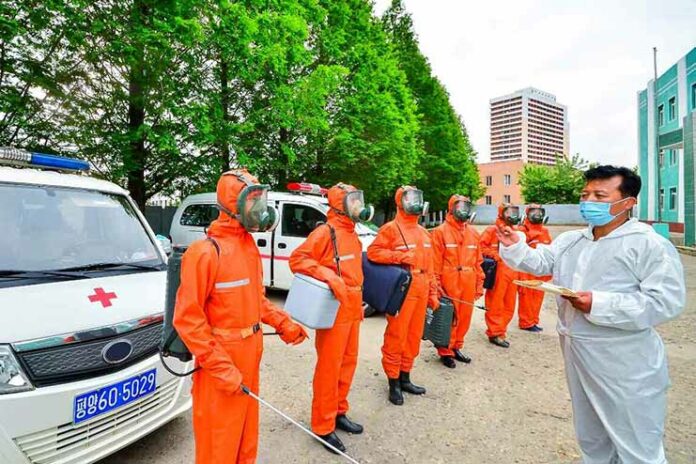
North Korean authorities are conducting mass testing in Pyongyang and other areas of the country to track down fever patients, and people who refuse testing are labeled “disloyal,” Daily NK has learned.
“The authorities are mainly relying on taking people’s temperatures for coronavirus testing,” a source in Pyongyang told Daily NK on Friday. “If someone has a fever for more than two days along with coughing and difficulty breathing, they are designated to be quarantined.”
In other words, North Korean officials are screening people based on whether someone has a fever or how serious the fever is and not with diagnostic equipment. In fact, the authorities are using the term “person with fever” rather than “confirmed case of COVID-19.”
“If a sick person’s temperature exceeds 38 degrees Celsius, they are sent to an isolation facility, no questions asked,” the source continued, adding, “If a fever persists for more than two days, people must self-isolate for seven days.”
The source’s report suggests that those with a high fever of 38 degrees or more are transferred to separate isolation facilities, while those who have a mild fever lasting more than a couple days are quarantined at home.
Daily NK recently reported that North Korea had set up temporary quarantine facilities in the Rakrang and Unjong districts of Pyongyang.
“People who have a fever must self-report [their condition to the authorities],” the source said. “Those who think they have a fever fall in the category of having to be tested along with their families and even their neighbors.”
Officials visit homes to check fevers, while those who refuse testing are labeled “disloyal”
North Korean officials are also visiting people’s homes to check their temperatures.
“The head of our neighborhood sanitation and quarantine team is conducting fever checks at people’s homes together with the head of the local inminban [people’s unit] and one other person. They are using a device that looks like a gun to measure people’s temperatures, and order people to stay at home if their temperature exceeds a certain level,” a Daily NK source in North Pyongan Province said last Friday. “Other than the device to measure temperatures, they don’t use any other diagnostic equipment.”
According to him, the officials “all wear masks when moving around, and when they carry out tests at people’s homes they tell them to wear masks. People from the inminban go to every house during daily inspections while conducting the testing to see who has died and who isn’t at home, and they report what they find [to Pyongyang] through the Ministry of State Security.”
Moreover, a source in South Pyongan Province told Daily NK that, “Officials from local general hospitals and sanitation and quarantine stations are traveling around their jurisdictions taking temperatures.”
The South Pyongan Province-based source explained that these efforts are aimed at making up confirmed cases rather than identifying infected people. According to him, local officials are overreacting to the government’s order to find people showing fevers and other symptoms of COVID-19 before putting them under strict quarantine and actively monitoring their medical conditions.
“The atmosphere is brutal because people refusing to take part in the testing are being punished,” the source continued, adding, “The local party committee, as well as local security agencies, are labeling people who avoid getting tested because they don’t have any symptoms as ‘disloyal.’”
Meanwhile, COVID-19 PCR testing with saliva has been conducted in some parts of Pyongyang.
“In Pyongyang’s Central District and the area near the Taedong River area known as ‘Hospital Village,’ they used a test that required people to spit,” the source in Pyongyang said. “I’m not sure whether these kinds of tests have been conducted in other parts of the city or different areas of the country.”
Current COVID-19 diagnostic test methods include nasopharyngeal PCR, saliva PCR, and rapid antigen testing. According to data released by the Central Disaster and Safety Countermeasure Headquarters of the Korea Centers for Disease Control and Prevention, the sensitivity of a PCR test with saliva is 92%, slightly lower than that of non-pharyngeal PCR (a sensitivity of 98% or higher), but higher than rapid antigen testing (90%).
Testing centers operate 24 hours-a-day with even medical students mobilized to work
According to the source in Pyongyang, North Korean authorities are currently setting up designated testing centers throughout the city and are mobilizing all medical staff to test the city’s residents. The testing centers are operating 24 hours a day.
“There are testing centers designated by the disease control authorities in each region and district,” the source said, adding, “They have set up temporary tents or sanitation and quarantine centers in front of emergency rooms of clinics and district, county, and city hospitals.”
Doctors, doctors’ assistants, and nurses are carrying out the testing at these centers, and even medical school students and interns have been mobilized to work.
Amid all this activity, North Korean authorities are paying close attention to trends within the city to ensure there is no unrest among the people.
“Pyongyang medical and quarantine staff are telling people that just having a fever doesn’t mean you have come down with COVID-19, and the leadership is spreading the word that only medical staff can determine or diagnose whether a case is COVID-19 or not,” the source said. “The authorities are putting particular emphasis on ensuring no one jumps to conclusions or scares people with careless words. Nevertheless, there is a considerable number of people in the city who are full of anxiety.”
North Korea appears to have disclosed the numbers of COVID-19 cases in the country as a way to ensure people do not panic or cause unrest. This may also explain why North Korean media outlets are talking about scientifically unproven folk remedies to treat the coronavirus.
The translator requested anonymity. Edited by Robert Lauler.
Please direct any comments or questions about this article to dailynkenglish@uni-media.net.

















